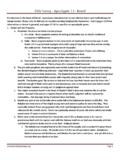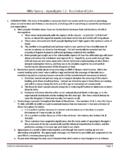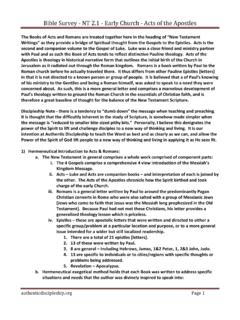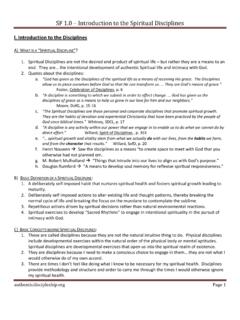Transcription of Bible Survey - NT 2.2 - Early Church - Romans Part 1
1 Bible Survey - NT - Early Church - Romans part 1 Page 1 Romans part 1 - INTRODUCTION AND CHAPTERS 1-8: A. Theological Introduction - Justification and Sanctification : How do these notions play out in the life of a disciple? Is one more important or foundational than the other? Some avow, The more I understand Justification the less concerned I am about Sanctification . Both deal with the inherent problem of impure, imperfect & Fallen humanity before a Pure, Perfect & Holy God. a. Justification is the term that means we have been placed into right-standing with God. i. It is initially the result of the Atonement of Jesus, and a person s appropriation and application of the God provided benefit of Grace for humanity. In this Original Sin context justification is a onetime event of the initial work of the Spirit resulting in personal conviction, remorse, and repentance of the individual and their Spirit Indwelling birth as children and heirs of the Kingdom of God. ii.
2 There is also an ongoing aspect of justification with the Spiritual formation practice of Examine and Confession - which encourages us to regularly stand before the scrutiny of the Spirit as we allow Him to bring to light any aspect of our life that misses the mark [sin] in our relationship with God. The ongoing process of this personal Illumination on the basis of confession - where we agree with God s conviction and confess that we are remorseful [agree with God in understanding our failure], and repentant [that we desire to change and do things differently in the future. b. Sanctification is the term that relates to the lifelong process of Spiritual Formation, where the heart and mind of Christ are gradually formed within us, and we are incrementally transformed into His reflection as saints of the Kingdom of God. i. God s action - Philippians 1:4-6 confirms that when authentic Spirit Life is initiated, God will see that the sanctification process will continue to its In all my prayers for all of you, I always pray with joy because of your partnership in the gospel from the first day until now, being confident of this, that he who began a good work in you will carry it on to completion until the day of Christ Jesus.]
3 Ii. Humanity s action - John 15:4-10 confirms we have a reciprocal relational responsibility - Abide in Me, and I in you. As the branch cannot bear fruit of itself unless it abides in the vine, so neither can you unless you abide in Me. If anyone does not abide in Me, he is thrown away as a branch and dries up; and they gather them, and cast them into the fire and they are burned. If you abide in Me, and My words abide in you, ask whatever you wish, and it will be done for you. Just as the Father has loved Me, I have also loved you; abide in My love. If you keep My commandments, you will abide in My love; just as I have kept My Father s commandments and abide in His love. B. General Background for the Text: a. The Book of Romans continues in the flavor of the New Testament It is all about faith in Jesus the Messiah. i. Jesus is the fulfillment of OT prophesies - both for the problem of sin initiated in the Fall, and the fruition of the Sinai and Davidic Covenants. ii. Messiah delivered spiritual redemption at His 1st coming; however the physical [material] redemption is postponed until His 2nd Coming.
4 Bible Survey - NT - Early Church - Romans part 1 Page 2 iii. The Old Covenant has been superseded by the greater New Covenant is now in effect where the Old Covenant was exclusive to Jews, the New Covenant is inclusive of Jews and Gentiles. iv. Messiah is the fulfillment of the Sinai Covenant which was for Jews alone. When the Jews rejected Jesus as their Messiah, this opened the door for all to enter into the Kingdom. Good News [Gospel] indeed! v. All New Covenant Kingdom citizens are 1st class citizens, there are no 2nd class citizens. It is all about equality in Jesus. In the Old Covenant, the King was served by the people; in the New Covenant, the King serves His people. vi. NC elevates the spiritual reality as the primary concern understanding that mankind [humanity] are spiritual/physical beings. OC was all about the present physical/material reality. OC blessings/curses were temporal, NC blessings/curses are eternal. vii. OC/OT was looking forward to the coming of Messiah; NC/NT is looking forward to the 2nd Coming while also looking backward on His 1st Coming.
5 B. Difference between Old Covenant and New Covenant [see Leviticus]: i. In the OC If someone was unclean and they touched someone who was clean, the clean is rendered unclean. The unclean always degrades the condition of the clean, while the reverse is not true. ii. In the NC when Jesus came in contact with the unclean, He rendered them such as the woman who touched Jesus cloak and was healed. Her unclean state was transformed by Jesus. This demonstrates a vastly superior covenant mediated by a vastly superior Moses as prophet could only acknowledge what was clean or unclean, Jesus as God can render the unclean clean. c. In the Old Covenant, the material world was divided into 2 groups Holy [Sacred] and Profane [Common]. The following diagram shows how the Old Covenant world view played out in the material world and the movement between the Holy and the profane [see diagram below]: HOLY PROFANE (Sacred) (Common) Desecrate Consecrate (Pollute) (Sanctify) Clean Purify Unclean Pure Defile Impure Bible Survey - NT - Early Church - Romans part 1 Page 3 C.
6 Paul is a complex individual with a complex identity, and to more properly understand him, he needs to be thought of as a complete as a Jew, a roman , and a Christian. a. Paul as a Jew: i. He was from the tribe of Benjamin and was named for the tribe s most famous individual King Saul. ii. He was a rabbinic disciple of Gamaliel one of the greatest rabbis of that age. He was accepted as a man of great scholarship and learning. iii. He was an up and coming Pharisee very zealous about the law and the nation. iv. His zealous nature caused him to approve of the stoning of Stephen (Acts 8:1), and of arresting and imprisoning of any Messianic Jews [ fallen Jews in terms of the nation] (Acts 9:1-2) who had abandoned the nation for the Way. On his way to arrest fallen Jews in Damascus, he met Jesus who redirected his life and purpose. b. Paul as a roman : i. He came from an important city and probably an important family as well. ii. He was born a citizen in an influential orthodox family in a university city know for its learning.
7 Iii. roman citizens were accorded rights and guaranteed protections under the roman law that did not apply to non-citizen members under the roman authority. iv. To be born a roman citizen attests to his family wealth and possibly to it being part of the aristocracy. Many people outside of Rome labored long and hard to earn their which Paul received as a birthright. c. Paul as a Christian: i. The Gospel Paul preached was not taught him by men, but was supernaturally revealed [given] to him directly by Jesus, who also called Paul as an apostle. ii. The magnitude of his personal guilt in persecuting the Church must be seen in contrast to God s Mercy and Grace and in light of Jesus which helps account for his zeal and tenacity. iii. He underwent a radical supernatural conversion. God stepped in and changed the trajectory of his life. iv. He spent 14 years as a disciple after his conversion experience until he entered public ministry. v. His initial teaching of Christology [theology of Jesus] came from Jesus Himself.
8 Vi. Paul understood better than others [including Peter and James] the unique change from the closed Jewish system under the Law to the open Christian system under Grace. vii. Paul spent 10 years in public ministry primarily to Gentiles but also to non-Christian Jews, and also to Jewish converts to Christianity that wanted to combine Law and Grace. viii. The special offering collected to respond to the suffering/need of the Christian brothers in Jerusalem in the spring of 57 AD is covered in Thessalonians. ix. He was ultimately executed along with Peter in Rome by Nero. Paul was beheaded which was customary for Romans , while Peter was crucified which was customary for non- roman outlaws and political enemies. Bible Survey - NT - Early Church - Romans part 1 Page 4 d. Once you get your mind around all three aspects of Paul s identity, you need to wrap them up together because he saw things through this combined perspective, with Christ being central and over-riding all else. D.
9 Chronology of Paul s Ministry and writings: a. Preparation and Ministry Occasion/Place Year AD i. Pentecost Jerusalem 33 ii. Conversion Damascus Road 34 iii. Discipling Turkey & Antioch 34-37 iv. 1st Jerusalem visit 37 v. 11 year span & 1st Missionary journey 37-48 vi. 2nd Missionary Journey-1st Macedonia 49-50 vii. 18 months in Corinth 50-51 viii. 2nd Jerusalem Visit, Antioch incident 51 ix. Ephesian ministry 52-55 x. Final Macedonian ministry, Jerusalem 56-57 xi. Final Jerusalem visit, imprisonment at Caesarea 57-59 xii. Trial before Festus, voyage to Rome 59-60 xiii. roman imprisonment 60-62 xiv. Final ministry in the East 62-64 xv. Return to Rome and execution 64-65 b. Epistles Letter Occasion Time xvi. Galatians 1st missionary 48-49 xvii. 1-2 Thess 2nd missionary 51-53 xviii. 1-2 Corinthians 3rd missionary 54-57 xix. Romans 3rd missionary 54-57 xx. Eph,Col,Phlm,Phil 1st Rom imprisonment 60-62 xxi. 1 Tim Titus Liberty 63-65 xxii.
10 2 Tim 2nd Rom imprisonment 66-67 c. Acts Chap Occasion xxiii. 13 & 14 1st missionary journey xxiv. 16-18 2nd missionary journey xxv. 19 & 20 3rd missionary journey xxvi. 28 1st roman imprisonment xxvii. Not included in Acts Liberty & 2nd roman imprisonment d. Paul the letter [Epistle] writer i. He wrote 13 known epistles - see list above. ii. Paul s letter format was borrowed from the Greco- roman cultural norm of communication. He didn t invent a new means of communication, but instead communicated within the norm of the culture he lived. iii. Letters were occasional correspondence - meaning he wrote to address a specific issue raised at a particular time or occasion with a specific group in mind; rather than casual correspondence meaning an arbitrary letter in which he wanted to Bible Survey - NT - Early Church - Romans part 1 Page 5 share some relevant information. Obviously, to one degree or another other churches had to deal with similar issues and received great value in the circulation of the epistles.








![Theology 3.1 Theology of the Church [Ecclesiology]](/cache/preview/a/f/9/c/b/8/4/1/thumb-af9cb8416ff3f661442ece1bfd5dced1.jpg)



